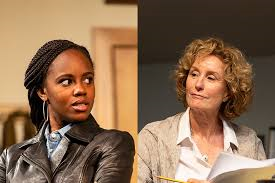Republished by kind permission from Neal’s Paper.
Conflicting facts can be difficult to reconcile, especially if people want the story to tell only one side or the other and not both, George Washington owned slaves. He knowingly participated in an institution that maintained an economy via the free labor and reprehensible treatment of other human beings. We live in a time when some people want all statues and tributes to George Washington taken away because one aspect of his life and others want to avoid talking of a great man’s grievous shortcomings.
THE NICETIES Eleanor Burgess’s play enjoying a marvelous production at Princeton’s McCarter Theatre, addresses our current conundrum and penchant for one-side-only absolutism, with careful but sweeping intelligence, meticulous, perhaps overmeticulous thoroughness, probing depth, and enlightening clarity.
Burgess’s characters—a professor and an undergrad who objects to her presentation of history—say the expected, but their familiarity, bordering occasionally on cant, sets up the myriad issues and ideas of the play. The seemingly obvious leads to some strong surprises and makes THE NICETIES, particularly as directed by Kimberly Senior and performed by the note-perfect Lisa Banes and Jordan Boatman, as excitingly thought-provoking as it is entertaining.
George Washington’s portrait hangs prominently on the wall of the professor’s office. She, Janine Bosco (Lisa Banes), is not a run-of-the-mill history prof. She is a distinguished and prolific author who is considered an expert in the American Revolution and particularly the factors that kept it from devolving into the chaos and bloodshed found in other revolutions. Janine posits it’s because a radical revolution did not follow the revolution for freedom and independence.
The student, Zoe (Jordan Boatman), is not so sure. She may not have the scholarly basis to question Janine’s reputation, but she has her instinct, her principles, and her verdict on George Washington. Zoe wants to write a thesis saying the Revolution was incomplete because it didn’t involve the slaves. She also refutes Janine’s position about America having a peaceful, successful Revolution, saying the only reason it didn’t lead to a radical revolution is because the people who would have forged that revolution were kept down.
 Historians, Janine counters, do not work on hunches. They haunt libraries, they search for firsthand accounts that support a thesis, they verify those accounts and reinforce them with others that agree and build a credible picture, they compare their findings with other authoritative texts.
Historians, Janine counters, do not work on hunches. They haunt libraries, they search for firsthand accounts that support a thesis, they verify those accounts and reinforce them with others that agree and build a credible picture, they compare their findings with other authoritative texts.
Thwarted, Zoe presents familiar accusations, and Janine, after trying to counter by explaining the painstaking research process, offers the familiar defenses. Arguments are presented well and never seem like cliché or some debate you may encounter in a high school classroom. Standards are being attacked as standards and being upheld and insisted upon.
The “can’t win” nature of partisanship that so plagues the 21st century United States, is visible in Burgess’s play and Senior’s production. The frustration of mounting a useful argument against deaf ears, and the length the absolute will go to have their way, also comes through.
To Senior’s credit, and to Banes’s and Boatman’s, THE NICETIES doesn’t devolve into some Stürm und Drang, knockdown dragout. Banes’s Janine maintain a cool, urbane professional air. Boatman’s Zoe keeps a different kind of cool, that of one who thinks she holds all the cards and has all the answers in her arsenal. The civilized nature of both characters make what they say all the most poignant and absorbing. They make you listen. No doubt, different audiences hear more logic in one that the other — Burgess aims to give Zoe her day and something important to impart. — but just as important as the arguments and the bases underpinning them, is the presentation of issues that are much a part, and a necessary part, of a national debate. These aren’t the issues of race, power, minority beyond race, and generational dissonance, although all are touched upon. These are issues that cut to the core of what gets in the way of serious debate and threatens a cultural divide that goes further away from being broached.
A leitmotif of THE NICETIES is reference to revolution and its repercussions, Janine’s primary study. Burgess had done no less than encapsulate the cultural revolution on the McCarter stage. We see it in immediate action, and it has its effect. A strong one.
Cameron Anderson endows Janine with the perfect dormer office, framed stark white and book strewn with the symbol of the university in one of the slanted windows. Kara Harmon’s costumes are so perfect, you would never know Janine and Zoe didn’t choose their clothes. Senior makes shrewd us of D.M. Wood’s lighting to enhance appropriate moods.
Burgess deserves abundant praise for how completely and cleverly she packed so much into her play. Kimberly Senior keeps masterful control of the action, timing outbursts and giving reason time to prevail before chaos is presented into the voice of someone emphatically but unemotionally reading a manifesto. She could not have chosen two better actresses to mount their character’s viewpoints and conflicts. Read the full review on Neal’s Paper >>>
[Berlind Theatre at McCarter Theatre, 91 University Place, Princeton, N.J.] January 11-February 10, 2019; mccarter.org.
